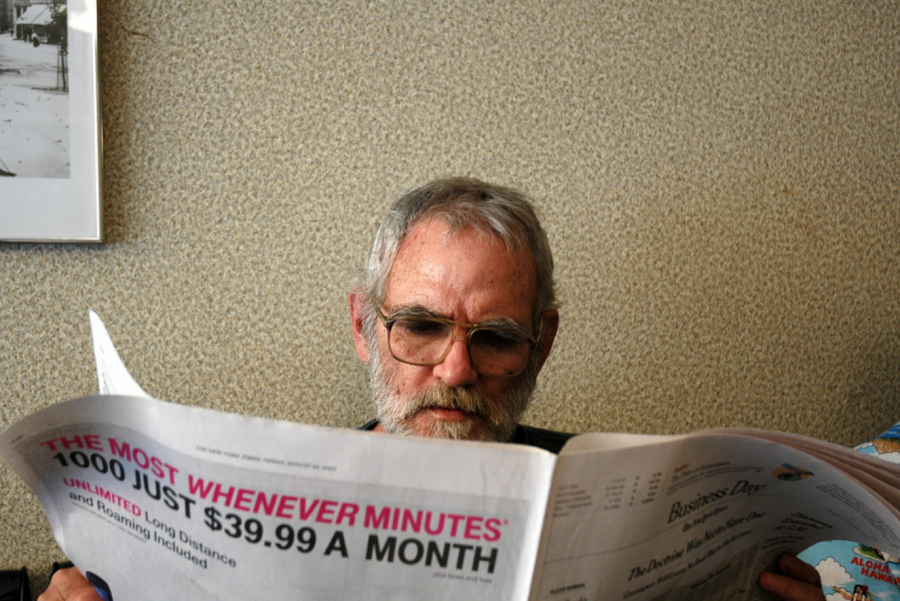A recent New York Times article has been poking at my mind for the past month. The article details the life of Erik Hagerman, a former Nike Executive, who has disconnected from any news past the November 2016 election. Hagerman has moved to a pig farm in Ohio and made it very clear to family and friends that, when with him, they should avoid mentioning any current events. He even goes so far as to play static white noise through headphones to avoid overhearing nearby conversations when in public. Hagerman is fully committed to learning nothing recent.
As weird as it seems to drop the world around you and start raising pigs, I do believe Hagerman’s lifestyle is worth a second look. He describes the feeling of disconnectedness simply as boring, but that does not make him unhappy. It may be telling of our times that, without a constant stream of news entertainment, we are bored with a “less informed” life. It calls to question what emotions the news should pull out of us; when do we break the barrier of interest and empathy and plunge into a full-blown obsession with current events?
It may not be the best thing to write on the pages of a newspaper, but I believe many of us have crossed this barrier. I have often caught myself scouring over the major new sites trying to find every detail about mass shootings, rogue countries and of course, our main act every day, President Trump. If the news cycle is the main conversation of our lives, then of course we are going to memorize the headlines and hold an opinion on everything. However, the stunning reality is that an individual cutting back on daily news does not change our social climate.
Knowing that fake news has shaken the grounds of trust, we also need to be skeptical of the accuracy of our information. Extensive amounts of time devoted to fake news is time that is gone for good. A great example is Pizzagate. I read every article I could about the entirely strange event, and for what reason? I found out that conspiracy theorists were running rampant, and we were all feeding into it. Would it have served me better to have never known about Pizzagate at all? There is a pretty good chance it wouldn’t have changed my life in any major way.
There are also the exhaustive attributes of modern news to consider. In a study performed by Graham Davey, it was found that viewing negative news could amplify worried feelings. This is not to say that we should live without worry, but rather that we should avoid constant worrying if we can. There is often little use in freaking out about events that are completely out of our control.
Hagerman is on the extreme end of this disconnect. I would even go so far to say that he is a step too deep into shutting out the rest of the world. His ignorance of anything current could prevent him from ever taking social action.
An essential aspect of being an informed citizen is taking action based on all this information. As information has become more and more accessible in the modern age, it is also easier than ever to gather together in order to make a positive change. Instead of being knowledgeable about every headline, take action on those issues that cause the most interest and passion—it is unrealistic to think that any one of us could influence every cause that we read about.
Yet, the concept of news as entertainment is what I find most dangerous. Entertainment shouldn’t exhaust us; rather it should make us happier and more fulfilled. Designating a specific timeframe to news every day can help immensely with avoiding the obsession. The reality is that being a day or two late to a headline won’t make any change, so stop glancing at headlines every 10 minutes. Stay informed, but don’t overwhelm yourself and don’t obsess over headlines when some kind of action can be taken.
Cameron Smith is a Collegian columnist and can be reached at [email protected].




















John Aimo • Apr 11, 2018 at 7:19 pm
I like most americans don’t really take the news seriously anymore, what is the trust rating in media around 10 percent? It is so full of bias, slanted reporting and falsehood I just turn it out and unless the article is proven(without anonymous sources) I generally assume that it’s false or untrustworthy.
Aside from that I would argue that to rely on the news as a source of information is an indication of low intelligence and it’s probably no accident that the media is often used as a forum to manipulate the views of others because of that effect. News articles often include very little information, are brief and if anything convey a selective portrayal of an event or issue or person. It’s not something an intelligent person would rely on to be informed or educated.